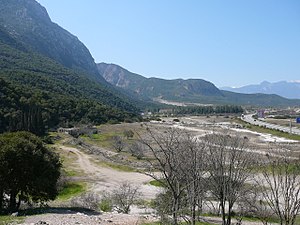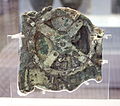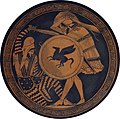
Back بوابة:اليونان القديمة Arabic Portal:Qədim Yunanıstan Azerbaijani Партал:Старажытная Грэцыя Byelorussian Portal:Griechische Antike German Πύλη:Αρχαία Ελλάδα Greek Portal:Antigua Grecia Spanish Portail:Grèce antique French Portal:Grecia antiga Galician פורטל:יוון העתיקה HE Պորտալ:Հին Հունաստան Armenian
The Ancient Greece Portal

Ancient Greece (Greek: Ἑλλάς, romanized: Hellás) was a northeastern Mediterranean civilization, existing from the Greek Dark Ages of the 12th–9th centuries BC to the end of classical antiquity (c. 600 AD), that comprised a loose collection of culturally and linguistically related city-states and other territories. Most of these regions were officially unified only once, for 13 years, under Alexander the Great's empire from 336 to 323 BC. In Western history, the era of classical antiquity was immediately followed by the Early Middle Ages and the Byzantine period.
Three centuries after the Late Bronze Age collapse of Mycenaean Greece, Greek urban poleis began to form in the 8th century BC, ushering in the Archaic period and the colonization of the Mediterranean Basin. This was followed by the age of Classical Greece, from the Greco-Persian Wars to the 5th to 4th centuries BC, and which included the Golden Age of Athens. The conquests of Alexander the Great spread Hellenistic civilization from the western Mediterranean to Central Asia. The Hellenistic period ended with the conquest of the eastern Mediterranean world by the Roman Republic, and the annexation of the Roman province of Macedonia in Roman Greece, and later the province of Achaea during the Roman Empire.
Classical Greek culture, especially philosophy, had a powerful influence on ancient Rome, which carried a version of it throughout the Mediterranean and much of Europe. For this reason, Classical Greece is generally considered the cradle of Western civilization, the seminal culture from which the modern West derives many of its founding archetypes and ideas in politics, philosophy, science, and art. (Full article...)
Selected article -
The Parthenon (/ˈpɑːrθəˌnɒn, -nən/; Ancient Greek: Παρθενών, romanized: Parthenōn [par.tʰe.nɔ̌ːn]; Greek: Παρθενώνας, romanized: Parthenónas [parθeˈnonas]) is a former temple on the Athenian Acropolis, Greece, that was dedicated to the goddess Athena. Its decorative sculptures are considered some of the high points of classical Greek art, and the Parthenon is considered an enduring symbol of Ancient Greece, democracy, and Western civilization.
The Parthenon was built in the 5th century BC in thanksgiving for the Hellenic victory over Persian Empire invaders during the Greco-Persian Wars. Like most Greek temples, the Parthenon also served as the city treasury. Construction started in 447 BC when the Delian League was at the peak of its power. It was completed in 438 BC; work on the artwork and decorations continued until 432 BC. For a time, it served as the treasury of the Delian League, which later became the Athenian Empire. (Full article...)Selected location -

Thermopylae (/θərˈmɒpɪliː/; Ancient Greek and Katharevousa: Θερμοπύλαι, romanized: Thermopylai; Ancient: [tʰermopýlai], Katharevousa: [θermoˈpile̞]; Demotic Greek (Greek): Θερμοπύλες, romanized: Thermopyles [θermoˈpiles]; "hot gates") is a narrow pass and modern town in Lamia, Phthiotis, Greece. It derives its name from its hot sulphur springs. In Greek mythology the Hot Gates is one of the entrances to Hades.
Thermopylae is the site of the Battle of Thermopylae between the Greek forces (including Spartans, Thebans and Thespians) and the invading Persian forces, commemorated by Simonides of Ceos in the epitaph, "Go tell the Spartans, stranger passing by, That here we lie, having answered our common oaths." Thermopylae is the only land route large enough to bear any significant traffic between Lokris and Thessaly. To go from north to south along the east coast of the Balkans requires use of the pass.
In ancient times it was called Malis, named after the Malians (Ancient Greek: Μαλιεῖς), a Greek tribe that lived near present-day Lamia at the delta of the river Spercheios in Greece. The Malian Gulf is also named after them. In the western valley of the Spercheios their land was adjacent to the Aenianes. Their main town was named Trachis. In the town of Anthela, the Malians had an important Temple of Demeter Amphictyonis, an early center of the Anthelan Amphictyony. (Full article...)Did you know...
- ... that the Greeks did not have a term for "religion"?
- ... that Ancient Greek cuisine was characterized by its frugality, reflecting agricultural hardship?
- ... that the economy of ancient Greece was characterized by the extreme importance of agriculture, all the more so because of the relative poverty of Greece's soil?
Related portals
Selected biography -
Homer (/ˈhoʊmər/; Ancient Greek: Ὅμηρος [hómɛːros], Hómēros; born c. 8th century BC) was a Greek poet who is credited as the author of the Iliad and the Odyssey, two epic poems that are foundational works of ancient Greek literature. Homer is considered one of the most revered and influential authors in history.
Homer's Iliad centers on a quarrel between King Agamemnon and the warrior Achilles during the last year of the Trojan War. The Odyssey chronicles the ten-year journey of Odysseus, king of Ithaca, back to his home after the fall of Troy. The poems are in Homeric Greek, also known as Epic Greek, a literary language which shows a mixture of features of the Ionic and Aeolic dialects from different centuries; the predominant influence is Eastern Ionic. Most researchers believe that the poems were originally transmitted orally. Despite being predominantly known for its tragic and serious themes, the Homeric poems also contain instances of comedy and laughter. (Full article...)List of selected biographies
|
|---|
General images -
Selected picture

Photo credit: ?
Ruins of the Ancient Olympic Games training grounds at Olympia.The historical origins of the Ancient Olympic Games are unknown, but several legends and myths have survived. One of these involved Pelops, king of Olympia and eponymous hero of the Peloponnesus, to whom offerings were made during the games.
Topics
Life: Agriculture · Art · Cuisine · Democracy · Economy · Language · Law · Medicine · Paideia · Pederasty · Pottery · Prostitution · Slavery · Technology · Olympic Games
Philosophers: Pythagoras · Heraclitus · Parmenides · Protagoras · Empedocles · Democritus · Socrates · Plato · Aristotle · Zeno · Epicurus
Authors: Homer · Hesiod · Pindar · Sappho · Aeschylus · Sophocles · Euripides · Aristophanes · Menander · Herodotus · Thucydides · Xenophon · Plutarch · Lucian · Polybius · Aesop
Buildings: Parthenon · Temple of Artemis · Acropolis · Ancient Agora · Arch of Hadrian · Temple of Zeus at Olympia · Colossus of Rhodes · Temple of Hephaestus · Samothrace temple complex
Chronology: Aegean civilization · Minoan Civilization · Mycenaean civilization · Greek dark ages · Classical Greece · Hellenistic Greece · Roman Greece
People of Note: Alexander The Great · Lycurgus · Pericles · Alcibiades · Demosthenes · Themistocles · Archimedes · Hippocrates
Art and Sculpture: Kouroi · Korai · Kritios Boy · Doryphoros · Statue of Zeus · Discobolos · Aphrodite of Knidos · Laocoön · Phidias · Euphronios · Polykleitos · Myron · Parthenon Frieze · Praxiteles
Subcategories
Things to do
 |
Here are some tasks awaiting attention:
|
Associated Wikimedia
The following Wikimedia Foundation sister projects provide more on this subject:
-
Commons
Free media repository -
Wikibooks
Free textbooks and manuals -
Wikidata
Free knowledge base -
Wikinews
Free-content news -
Wikiquote
Collection of quotations -
Wikisource
Free-content library -
Wikiversity
Free learning tools -
Wiktionary
Dictionary and thesaurus
© MMXXIII Rich X Search. We shall prevail. All rights reserved. Rich X Search






















































